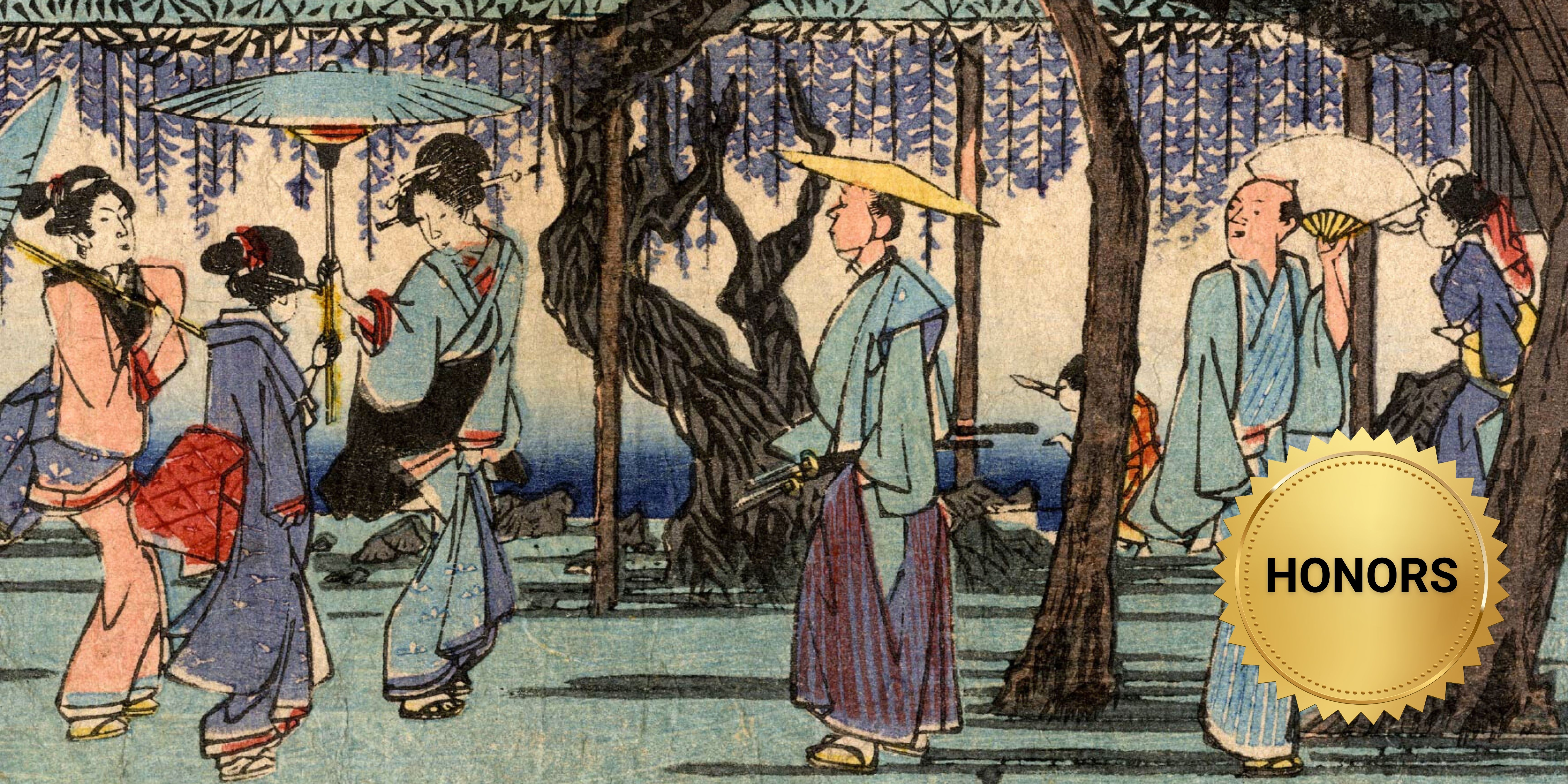Bachelor of Arts Honors in East Asian Studies Degree Program Guide

This Honors program is designed for students who want to go on to research Asia in graduate school. In addition to their coursework, students do a major research project in collaboration with one of our professors; this gives our honors students a unique opportunity to learn research skills, build relationships with faculty members, and supercharge their graduate school applications.
This exciting undergraduate program emphasizes giving students high levels of language proficiency in Chinese, Korean and Japanese language, while also giving them the cultural understanding to be effective professionals in a variety of business and government careers relating to Asia.
Academic Requirements for East Asian Studies Honors students
- Promotion from year to year in the honors programs requires a minimum GPA of 3.0 with an average of at least 3.3 on all courses applied to the major
- Graduation with Honors requires a GPA of at least 3.0 with an average of at least 3.3 in all courses applied to the major. Graduation with First Class Honors requires a GPA of at least 3.7 in all senior courses applied to the major and a GPA of at least 3.5 or better on the last 30 units completed
- EASIA 101 and a minimum of 48 units to a maximum of 60 units at the senior level in EASIA, CHINA, JAPAN, KOREA, including:
- CHINA 402 - Advanced Chinese II AND CHINA 341 - Classical Chinese I
OR
- JAPAN 402 - Advanced Japanese II AND JAPAN 341 - Classical Japanese I
OR
- KOREA 402 - Advanced Korean II
- 12 units in EASIA at the senior level, including 6 units in EASIA at the 400-level, excluding EASIA 480 and EASIA 490
- EASIA 480 - Honors Seminar
- EASIA 490 - Honors Thesis to be written under the supervision of an advisor appointed by the Department
Academic Requirements for East Asian Studies Combined Honors Students
- EASIA 490, with the permission of the Honors Advisor, students pursuing Combined Honors in East Asian Studies and another discipline may write a combined honors essay (INT D 520) that is supervised jointly by faculty from both programs and the subject of which integrates both disciplines. In these circumstances, students will complete INT D 520 in place of EASIA 490
- EASIA 101 and a minimum of 48 units to a maximum of 60 units at the senior level in EASIA, CHINA, JAPAN, KOREA, including:
- CHINA 402 - Advanced Chinese II AND CHINA 341 - Classical Chinese I
OR
- JAPAN 402 - Advanced Japanese II AND JAPAN 341 - Classical Japanese I
OR
- KOREA 402 - Advanced Korean II
- 12 units in EASIA at the senior level, including 6 units in EASIA at the 400-level, excluding EASIA 480 and EASIA 490
- EASIA 480 - Honors Seminar
- EASIA 490 - Honors Thesis to be written under the supervision of an advisor appointed by the Department
- The Department reserves the right to place students in the language course appropriate to their level of study. Students assessed by the Department as having a prior language proficiency beyond 400-level will be required to pursue a different language for the major
- In a combined honors program, students must meet the promotion and graduation standards of each department. The requirements for Honors in East Asian Studies are outlined above
The University of Alberta Calendar will always contain the most up-to-date degree requirements for your program, and your requirements are determined by the calendar year you were admitted in.
What kinds of courses can East Asian Studies Honors students take?
- EASIA 101 - Understanding East Asia
- EASIA 205 - Language in Chinese Society
- EASIA 222 - East Asian Indigeneity
- EASIA 247 - Samurai, Geisha, and Ghosts
- EASIA 316 - Japanese Language and Society
- EASIA 342 - Anime: Process, History, and Aesthetics
- EASIA 376 - Korean Sociolinguistics
- EASIA 451 - Topics in Taiwan Studies
- EASIA 480 - Honors Seminar
- EASIA 490 - Honors Thesis
What kinds of careers can you pursue with an East Asian Studies Honors degree?
There are many different fields and career paths that students can pursue with an East Asian Studies Honors degree. From cultural affairs to translation, graduates are equipped with intercultural communication, market research and analytical thinking skills to name a few, that are assets in today’s job market. Although there is a list of career options below, it is important to understand that careers are not linear. Intentionally engaging in a variety of activities and following your curiosities will open new opportunities that you might not have expected. To learn more about how you can put your Arts degree to work, stop by the HUB Career Centre (8917 HUB Mall) for more information.
- Cultural Program Director
- Museum Curator
- Translator & Interpreter
- Localization Specialist
- Educator (Professor, Secondary or Primary)
- Diplomat or Foreign Service Officer
- Cultural Affairs Specialist
- Film & Television Production
- Travel Consultant
- Cultural Event Coordinator
- International Business Consultant
- Market Research Analyst
- Video Game Tester & Editor
- International Aid Worker
- +More!
Interested in gaining work experience related to your career goals? If so, apply to Arts Work Experience to gain full-time, PAID, work experience before you graduate!
Important Links
- Department website
- Students’ association information
- Full program overview
- Prospective student information and application
- Graduate studies information
- Current Arts student advising
Department Contact Information
- General department email: easia@ualberta.ca
- Department Undergraduate Student Advisor email: easiaug@ualberta.ca